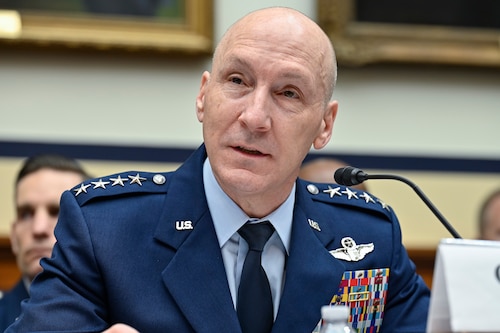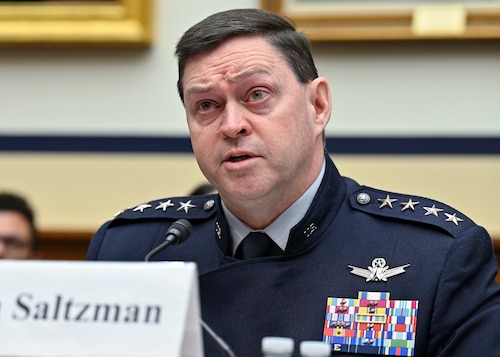Department of the Air Force Secretary Frank Kendall and the top-ranking military leaders from the Air Force and Space Force told a House committee April 17 that adequately defending the nation against modern-day adversaries demands the services modernize quickly and that Congress deliver funding in a timely and predictable manner.
The dominant messages from Kendall, Air Force Chief of Staff Gen. David W. Allvin and Chief of Space Operations Gen. Chance Saltzman were nearly word-for-word identical to the views they expressed the day before to members of the Senate Armed Services Committee and a week earlier to a Senate Appropriations subcommittee.
"As you are aware, the six-month delay has had a real impact. That time cannot be recovered, but at least we can now move forward with our urgent modernization priorities," Kendall told the House Armed Services Committee, referring to the current year's budget being finalized last month instead of Oct. 1, 2023, when the fiscal year began.
"Time is my greatest concern - we are in a race for military technological superiority with a capable pacing challenge," Kendall told lawmakers. "Our cushion is gone - we are out of time. As we have briefed the Committee at a classified level, the pacing threat moves steadily forward. Continued failure to provide on-time authorities and appropriations will leave the Air Force and Space Force inadequately prepared."
But departing from his prepared remarks, Kendall also used Iran's recent barrage of more than 300 ballistic missiles, drones and cruise missiles against Israel to vividly illustrate the stakes the United States, the Air Force and Space Force face today in competition with China.
"What Iran encountered was a highly contested environment. And what we face with China is a highly contested environment," Kendall told the committee of the April 13 attack in which nearly every one of the weapons launched against Israel was intercepted by a coalition that included the United States.
"What I'm dedicated to - and what we're all dedicated to here - is ensuring that the U.S. never has a result like Iran had in its attempt to attack Israel," Kendall said. "That's what's driving a lot of what we're doing and why it's so important to move on from legacy systems that weren't designed for that type of environment to ones that are designed for it and are capable of coping with that."
With that aside, the focus and priorities highlighted by Kendall, Allvin and Saltzman echoed the ones that have been voiced before. That the services must modernize to account for and meet China's actions and its growing military and position the services to meet the challenge. The three leaders provided insight and analysis on the Department's recently released $217.5 billion budget request for the 2025 fiscal year which begins October 1. They spoke about the trade-offs that were made and how the spending fits into the nation's larger national security strategy and why having a new budget in place on time is critical.
"The simultaneous demands of strategic competition with an aggressive and increasingly capable (China) and persistent, acute threats from around the globe require the Air Force to maximize the readiness of today's forces, while adapting our structures and processes to offer the best opportunity to prevail in an environment of enduring great power competition," Allvin said, adding, "Time is not on our side."
In describing the plans and needs for space, Saltzman was as clear and emphatic as he was in early congressional appearances. He also highlighted a new strategy the Space Force recently unveiled to better use commercial space firms to help the service achieve missions and develop new, more sophisticated equipment faster. Lawmakers offered general praise for the effort.
"Against a near-peer adversary, space superiority is the linchpin. Without it, we cannot deter conflict. Without it, we cannot provide vital effects. Without it, we cannot protect the joint force. Until we have built the infrastructure to achieve space superiority, the Space Force is a work in progress," he said.
For space, Saltzman said, "Our budget request is designed to build, train and equip the forces we need to perform each activity, preserving freedom of action in space while deterring and denying adversarial objectives."
As is typical, questions from lawmakers during the House hearing, which lasted nearly 2 ½ hours, were varied and diverse, touching on topics ranging from the utility of a three-legged nuclear deterrent to mission capable rates for the frontline F-35 fighter, to the analysis driving decisions to divest planes and platforms to changes in recruiting and retention. From the two hearings this week came questions about diversity and equality programs, the Space Force's plans for space functions currently assigned within the Air National Guard, and more local concerns such as plans for bases in Michigan and Nebraska.
Kendall said the nuclear triad of land based ballistic missiles, submarine launched missiles and, finally, weapons attached to aircraft remains a valid approach. That system, he said, ensures the U.S. retains the ability to respond if needed and that certainty underwrites nuclear deterrence that has been successful for generations.
In response to repeated questions about Space Force's preference to transition Guardsmen to part-time Guardian positions within the Space Force in place of creating a Space National Guard, Kendall said the vigorous debate was out of proportion to the actual effect since only an estimated 600 personnel would be affected.
Additionally, he said that the personnel would operate much like they would if in the National Guard and that using a new law approved last year is more effective and efficient.
"It's a shame this has become politicized," Kendall said, noting that the law Congress approved last year gives Space Force flexibility in managing part time Guardians while avoiding additional bureaucracy and overhead.









